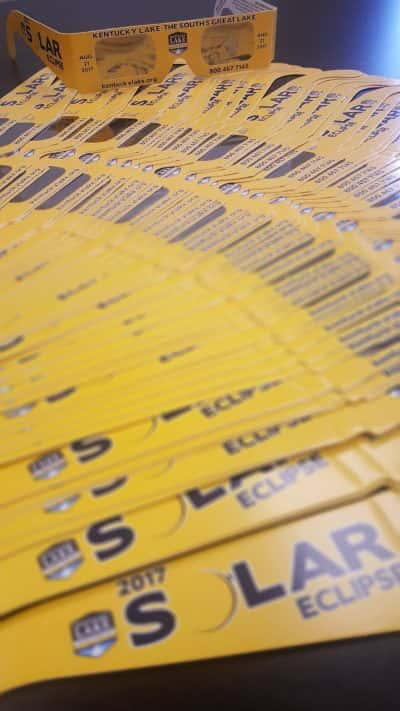 Local businesses are putting out the word on the safety of eclipse glasses just one month shy of the big event.
Local businesses are putting out the word on the safety of eclipse glasses just one month shy of the big event.
Yesterday, NASA issued a warning to residents to beware of glasses that could prove unsafe to view the total solar eclipse, which will take place Aug. 21. NASA advised viewers to use only eclipse glasses with ISO 12312-2 printed somewhere on the set, and those manufactured by U.S. Companies American Paper Optics, Rainbow Symphony, Thousand Oaks Optical and TSE 17 were guaranteed safe to use. NASA cautioned that glasses manufactured outside the U.S., as well as previously used and wrinkled or scratched glasses may not protect viewers’ vision.

Local businesses have since worked to put out the word that glasses distributed to customers were, in fact, safe to use.
Community Financial Services Bank (CFSB), in a statement to local media, guaranteed glasses staff issued while supplies lasted were deemed safe. CFSB’s glasses were printed with ISO 12312-2:2015 on the inside of the left ear and were manufactured in Reseda California by Rainbow Symphony Inc.
“CFSB’s glasses went like hot cakes, but if you were able to get some while supplies lasted, rest assured, they are safe for use on the big day,” the statement reads.
Kentucky Lake/Marshall County Tourism issued a similar notice to the public on its social media site, noting the importance of having proper eyewear on the day of the event. Tourism office glasses, which are the same as those for sale in Benton City Hall, were also designated safe to use by NASA guidelines.
Again, residents are urged to use caution when viewing the event. Everyday sunglasses are not safe to use, nor should viewers attempt to look at the partial or uneclipsed sun through unfiltered camera, telescope, binoculars or any other optical device to view the eclipse. Similarly, NASA warns that residents should not look at the sun through any of the aforementioned devices while wearing eclipse glasses or solar hand-held viewer, as concentrated solar rays will damage the filter and enter the viewer’s eyes, potentially causing serious injury.
Looking directly at the sun is unsafe except during the brief total phase of a solar eclipse, when the moon entirely blocks the sun’s bright face, which will happen only within the narrow path of totality. If within the path of totality – which Marshall County is – residents should only remove their solar filters when the moon completely covers the sun’s bright face and it suddenly gets dark; once totality has concluded, residents should return to using glasses to view the event in its remaining stages of partial eclipse.
For more information on eclipse viewing safety, or to find alternative viewing methods, visit https://eclipse2017.nasa.gov/safety.